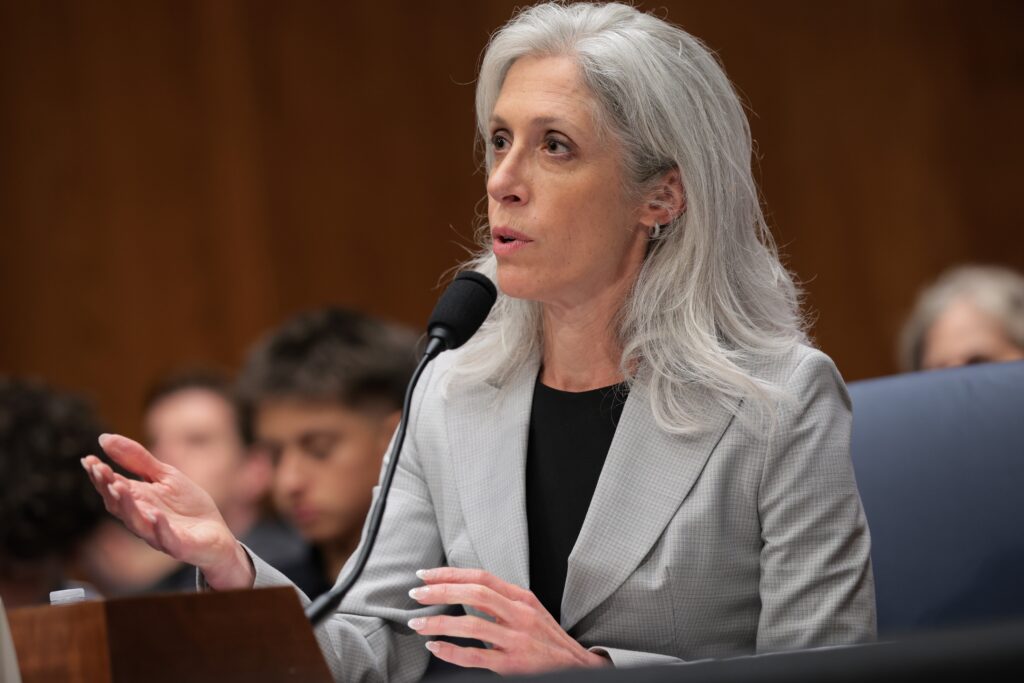
Susan Monarez, President Donald Trump’s nominee to be the director of the Centers for Disease Control and Prevention, testifies during her confirmation hearing before the U.S. Senate Committee on Health, Education, Labor, and Pensions on June 25, 2025. (Photo by Kayla Bartkowski/Getty Images)
WASHINGTON — Members of the U.S. Senate Committee on Health, Education, Labor and Pensions pressed President Donald Trump’s nominee to lead the Centers for Disease Control and Prevention about vaccine recommendations Wednesday after the Health and Human Services secretary fired members of a critical vaccine panel this month.
Trump’s pick, former acting CDC Director Susan Monarez, said that she trusted vaccines while defending HHS Secretary Robert F. Kennedy Jr.’s decision this month — widely seen as part of a vaccine-skeptical agenda — to fire all 17 members of the Advisory Committee on Immunization Practices, or ACIP, and recommend eight new members.
“Part of the secretary’s vision in restoring public trust is making sure that the American people can be confident in the way the evidence and science is driving decision-making,” she told senators.
The panel’s seven members — one dropped out this week — will meet Wednesday and Thursday to review data and vote on new vaccine recommendations. The recommendations carry significant weight as insurance providers and federal health programs like Medicaid use them to determine if shots are covered and schools rely on them for immunization mandates.
Cassidy questions
Louisiana Sen. Bill Cassidy, who chairs the committee, said he was concerned about ACIP, especially as a non-CDC staff member is scheduled to give a presentation to the committee about thimerosal, a mercury-based preservative. The panel is expected to vote on approving flu shots that contain the compound.
Lyn Redwood, the former head of Children’s Health Defense, the anti-vaccine group that Kennedy founded, is giving the presentation arguing that thimerosal causes autism. The CDC’s own research shows that thimerosal does not cause autism.
Cassidy said that while Monarez had no part in this week’s ACIP meeting, or the agenda, he said that “if the ACIP hearing today is being used to sow distrust, I would ask that going forward, that you would make sure that there really was a balanced perspective.”
“Yes, someone can speak as a critic, but there should be someone who is reviewing the overwhelming evidence of the safety of vaccines,” Cassidy, who is a physician, said.
Monarez, who was the agency’s acting director from January to March, said that she trusted vaccines and that immunization was important to save lives.
If Monarez is confirmed by the Senate, she would be the first director of the CDC without a medical degree in nearly 70 years. She has a Ph.D. in microbiology and immunology.
More concerns about vaccine panel
Cassidy was not the only Republican on the panel concerned about the firing of all the members of ACIP.
Alaska Republican Sen. Lisa Murkowski said she was concerned about the backgrounds of the seven new panelists.
“I would hope that one of the things that you would all be looking into is to make sure that these individuals are going to be looking at the science in front of them, (and) leave their political bias at home,” Murkowski said.
Democratic Sens. Patty Murray of Washington state and Angela Alsobrooks of Maryland also pressed Monarez about Kennedy’s actions to fire everyone on the panel.
Murray asked Monarez if the new members of the panel voted to not recommend vaccines, if she would listen to that recommendation.
Monarez sidestepped the question and said the roles at ACIP were difficult to fill and that members needed to pass an ethics process.
“If they have not gone through an ethics approval process they shouldn’t be participating in the meetings,” she said.
Alsobrooks asked Monarez if she believed the 17 members fired from ACIP lacked qualifications.
Monarez did not answer the question, but said Kennedy’s reasoning for “resetting the ACIP to a new cohort was going to be on the path of restoring public trust.”
Grant funding and layoffs
Senators also raised concerns about grants that had been canceled, even though Congress already approved the funds.
Maine GOP Sen. Susan Collins, who is the chairwoman of the Senate Committee on Appropriations, said that her state is suffering from a high level of Lyme disease and as a result a vaccine was in the works at a research institute in Maine.
“This vaccine is very promising and I want to make sure that it is allowed to continue to its conclusion,” Collins said.
Monarez agreed and said if she is confirmed, she will specifically work to make sure funding for that vaccine continues.
“It’s ironic that our dogs can get a vaccine to protect them against tick-borne illnesses like Lyme disease but we humans can’t and I hope we can remedy that,” Collins said.
Sen. Tim Kaine, Democrat of Virginia, pressed Monarez about the elimination of the Office on Smoking and Health at the CDC. He asked if she was involved in laying off all the staff in April, the month after her brief stint as acting director ended.
“I had no participation in (the layoffs) after I left,” she said.
Fluoride in water
Alsobrooks pressed Monarez about Kennedy’s push to have the CDC stop recommending that low levels of fluoride be placed in public drinking water.
Fluoride is added in drinking water to help prevent cavities, tooth decay and other dental health issues.
Alsobrooks asked Monarez, who is her constituent, if the public water supply that contains fluoride in Potomac, Maryland, where Monarez lives, was safe to drink.
“I believe the water in Potomac, Maryland, is safe,” Monarez said.





